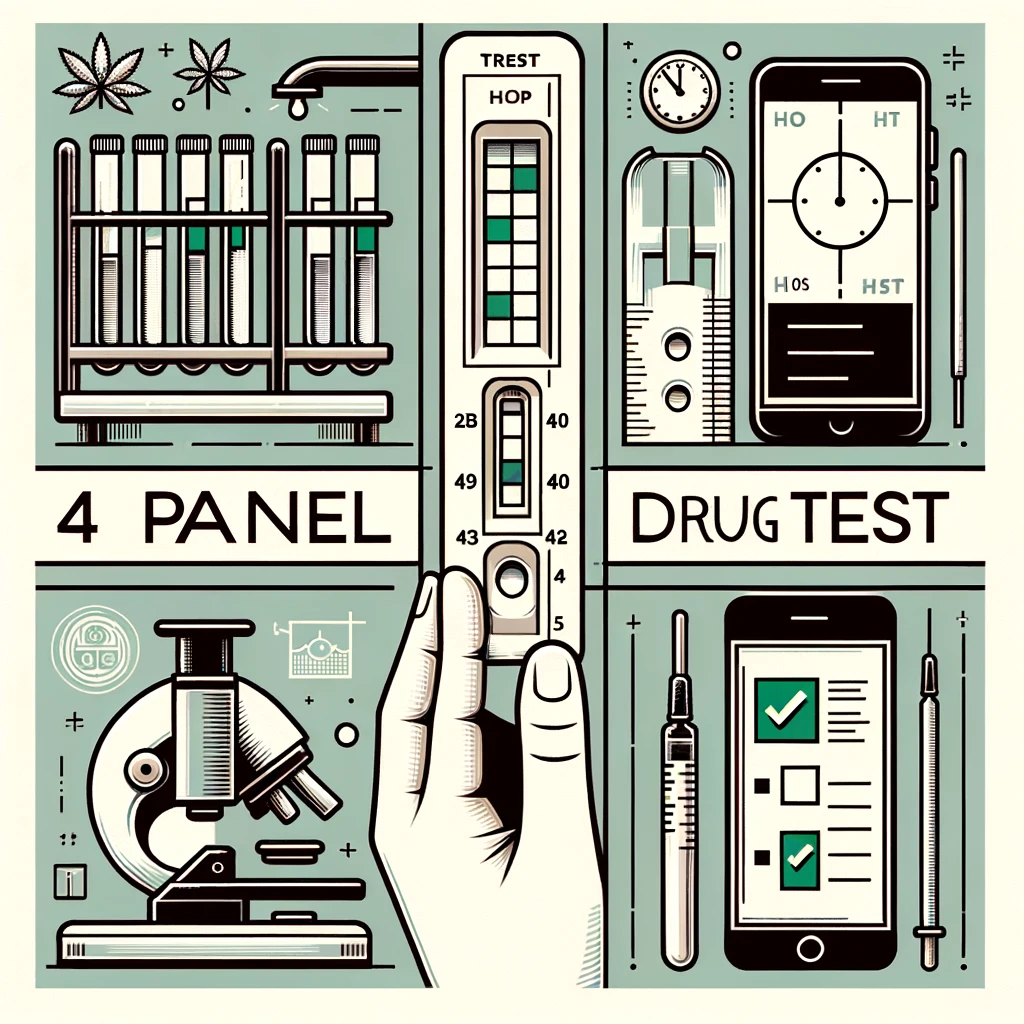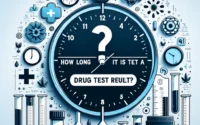Understanding the 4 Panel Drug Test: Comprehensive Analysis and Significance
Last Updated on February 3, 2024 by Lily

Drug testing plays a vital role in various settings, including employment screenings, athletic competitions, and forensic investigations. One commonly used type of drug test is the 4 panel drug test, which provides information on the presence or absence of specific substances in a person’s system. In this article, we will delve into the intricacies of the 4 panel drug test, including its purpose, components, and the substances it screens for.
What is a 4 Panel Drug Test?
A 4 panel drug test is a diagnostic tool designed to detect the presence of specific substances in an individual’s system. It is called a “4 panel” test because it typically screens for four commonly abused drugs. These tests are often administered through urine samples, although other testing methods like saliva, blood, or hair samples may be used depending on the situation.
Components of a 4 Panel Drug Test:
The 4 panel drug test typically screens for the following substances:
Marijuana (THC):
The test detects the presence of Tetrahydrocannabinol (THC), the psychoactive compound found in cannabis. This component is of particular interest due to the increasing legalization and decriminalization of marijuana in various jurisdictions.
Cocaine:
Cocaine is a stimulant drug derived from the coca plant. The test aims to identify the presence of cocaine metabolites in the system, providing evidence of recent cocaine use.
Opiates:
Opiates, such as heroin and morphine, are powerful narcotics that can cause addiction and severe health issues. The 4 panel drug test helps identify the presence of opiate metabolites in the body.
Amphetamines:
Amphetamines are central nervous system stimulants often used recreationally or illicitly. The test aims to detect the presence of amphetamines and their metabolites, including drugs like methamphetamine.
Significance and Application:
The 4 panel drug test serves various purposes in different contexts:
Employment Screenings:
Many companies and organizations require pre-employment drug screenings to ensure a drug-free work environment. The 4 panel drug test is often employed to check for common substances that may impair job performance or pose a safety risk.
Sports and Athletics:
Athletic organizations, both amateur and professional, often utilize drug tests to maintain fair competition and prevent the use of performance-enhancing drugs. The 4 panel drug test assists in identifying athletes who may be using prohibited substances.
Forensic Investigations:
In legal and forensic settings, the 4 panel drug test can provide valuable evidence in criminal investigations. It can determine if a person was under the influence of drugs at the time of an incident or assist in determining cause of death.
Limitations of the 4 Panel Drug Test:
Certain medications, herbal supplements, or even certain foods can potentially interfere with the 4 panel drug test and result in false-positive results. For example, poppy seeds can sometimes cause a false-positive for opiates.
Cross-Reactivity:
The 4 panel drug test relies on specific immunoassay techniques that can have cross-reactivity with substances similar in structure to the target drugs. This cross-reactivity can lead to false-positive results for substances that are not actually present in the individual’s system.
Limited Information:
While the 4 panel drug test provides information on the presence or absence of specific substances, it does not provide detailed information on the quantity of drugs present or the level of intoxication. This limitation can be significant in cases where precise measurements are required.
Invasive Testing:
Depending on the testing method used, such as urine or blood samples, the 4 panel drug test may be considered invasive by some individuals. This can raise concerns about privacy, discomfort, or potential health risks associated with the testing process.
Emerging Drug Trends:
The field of drug abuse is constantly evolving, and new substances are continuously being synthesized. The 4 panel drug test may not include these emerging substances, leaving them undetected unless specific additional tests are conducted.
Frequently Asked Questions (FAQs):
What does a 4 panel drug test test for?
A 4 panel drug test typically tests for the presence of the following substances: marijuana (THC), cocaine, opiates, and amphetamines.
What is included in a 4 panel drug test?
A 4 panel drug test includes the necessary components to screen for marijuana, cocaine, opiates, and amphetamines. The specific testing method can vary, but it is commonly conducted using urine samples.
What is on a 4 panel drug test?
On a 4 panel drug test, the test panels represent the substances being screened for. The four substances typically included in a 4 panel drug test are marijuana (THC), cocaine, opiates, and amphetamines.
Does a 4 panel drug test test for weed?
Yes, a 4 panel drug test includes marijuana (THC) in its panel of substances being screened for. It can detect the presence of THC metabolites in a person’s system, indicating recent marijuana use.
What does a 4 panel drug test test for?
A 4 panel drug test tests for the presence of four specific substances: marijuana (THC), cocaine, opiates, and amphetamines. It provides information on whether these substances are present in a person’s system.
What does a 4 panel drug test measure?
A 4 panel drug test measures the presence or absence of marijuana (THC), cocaine, opiates, and amphetamines in a person’s system. It is a qualitative test that provides a yes or no result for each substance.
What’s on a 4 panel drug test?
A 4 panel drug test includes the testing panels for marijuana (THC), cocaine, opiates, and amphetamines. These panels contain the necessary components to detect the presence of these substances in a person’s sample.
How long can these substances be detected in a 4 panel drug test?
The detection window for each substance can vary based on factors such as the individual’s metabolism, frequency of use, and the specific testing method. In general, marijuana (THC) can be detected for a few days to several weeks, while cocaine, opiates, and amphetamines can be detected for a few days.
Can a 4 panel drug test detect other drugs?
No, a 4 panel drug test is specifically designed to test for marijuana, cocaine, opiates, and amphetamines. It does not screen for other drugs or substances that are not included in the panel.
Are 4 panel drug tests commonly used in workplace drug screenings?
Yes, 4 panel drug tests are commonly used in employment screenings to detect recent drug use. However, it’s important to note that the specific testing requirements may vary depending on the employer and industry.
Can a 4 panel drug test determine the level of drug intoxication?
No, a 4 panel drug test only indicates the presence or absence of drugs in a person’s system. It does not provide information about the level of intoxication or when the drugs were used.
Are there any false-positive results with 4 panel drug tests?
While 4 panel drug tests are generally accurate, false-positive results can occur in certain situations. Factors such as cross-reactivity with other substances or medications, improper sample handling, or laboratory errors can contribute to false-positive results. In case of a positive result, further confirmatory testing is typically conducted to rule out false positives.
Can a 4 panel drug test be used for legal or forensic purposes?
Yes, a 4 panel drug test can be utilized in legal and forensic settings to provide evidence of recent drug use. It can assist in investigations, such as determining if a person was under the influence of drugs during a specific incident.
How long does it take to get results from a 4 panel drug test?
The turnaround time for obtaining results from a 4 panel drug test can vary depending on the testing method and the laboratory conducting the analysis. In general, results are typically available within a few days to a week.
Conclusion:
The 4 panel drug test is a widely used diagnostic tool that helps identify the presence of four commonly abused substances: marijuana, cocaine, opiates, and amphetamines. Its applications range from employment screenings to sports competitions and forensic investigations. While it provides valuable information, it is important to note that the 4 panel drug test has limitations and may not detect all substances or past drug use. As drug abuse continues to be a concern in society, drug testing remains an essential tool in promoting safety, health, and fairness in various domains.



